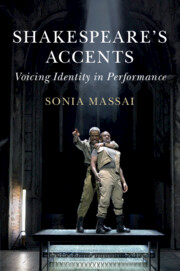‘Anyone who thinks that accents in Shakespeare's scripts are limited to the likes of Fluellen, MacMorris, Jamy, the Dauphin, Princess Catherine, and country clowns will find an earful in Sonia Massai's Shakespeare's Accents. So, too, will anyone who feels dubious about original pronunciation or positive about regional and foreign accents in contemporary productions. Massai has chosen to begin with contemporary productions and work backward toward accents cued in the scripts. The result is a beautifully modulated book in every sense of the word.'
Bruce Smith - University of Southern California
‘This deeply impressive book deserves to have a huge impact. Few scholars would have the ability or vision, to range so authoritatively from the language politics of Elizabethan England, through the accents of David Garrick, to the BBC archives of the 1930s and 40s and the lost history of original pronunciation. Along the way, we hear Beckett tweaking a 1964 production of Godot, and are vividly present at early performances of The Moors (2018). A triumphant combination of linguistics and performance criticism from a world-class scholar right at the top of her game.'
Jonathan Hope - Arizona State University
‘This is the most wide-ranging and detailed account I have read of regional and social accents in Early Modern English theatre. It places Shakespeare's own use of accents in a new and illuminating perspective, and relates them to the way accents are encountered in modern performance - including a theatrical history and appreciation of the original pronunciation movement. It fills a huge gap in the literature.’
David Crystal - University of Wales, Bangor
‘This expert blend of performance history and socio-cultural study is a fascinating account of the sounds and politics of accent, both on and off stage, over the past 400 years … At a time when theatre is being asked to think about how to diversify, to seem less elitist and more accessible, Massai’s work expands our understanding of longstanding assumptions and prejudices. In doing so, it also acts as a reminder of the forces that can arrest that project. While this research is clearly of scholarly value for academics and students of Shakespeare, theatre history and sociolinguistics, it is accessibly written and also of value to theatre makers.’
Sarah Grandage
Source: The Review of English Studies
‘Engaging, accessible, and groundbreaking, Shakespeare’s Accents is a triumph.’
D. M. Moore
Source: Choice
‘Shakespeare’s Accents expertly navigates the broad and tricky terrain of national, regional, and cultural accents with confidence and ease, as it is grounded in empirical evidence coupled with an experienced, keen, and sensitive ear for nuanced performance. It should have a permanent place on the shelves of theatre historians, linguists, and performance studies specialists, but also of actors, directors, and voice instructors.’
Daniel Yabut
Source: Cahiers Élisabéthains: A Journal of English Renaissance Studies
‘Shakespeare’s Accents expertly navigates the broad and tricky terrain of national, regional, and cultural accents with confidence and ease, as it is grounded in empirical evidence coupled with an experienced, keen, and sensitive ear for nuanced performance. It should have a permanent place on the shelves of theatre historians, linguists, and performance studies specialists, but also of actors, directors, and voice instructors.’
Daniel Yabut
Source: Cahiers Elisabethains
‘Sonia Massai’s history of accents on the British stage gives readers what they need to hear: a cultural history of the reception of Shakespearean speech.’
Carla Della Gatta
Source: Shakespeare Bulletin



